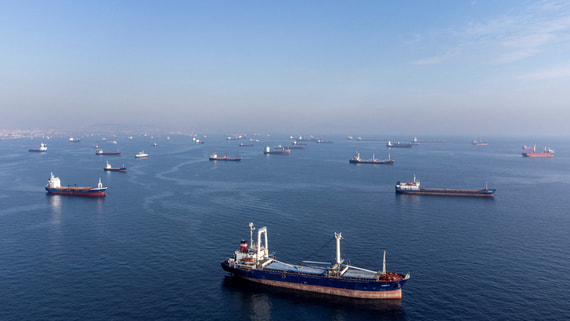Dozens of dry cargo ships accumulated near the Bosphorus
[ad_1]

Kyiv accuses Russia of massively blocking the passage of ships involved in a deal to export agricultural products from South Ukrainian ports by delaying the verification process. According to the Ukrainian side, more than 100 ships are idle in the traffic jam. As Vedomosti calculated based on open sources, we are talking about at least two to three dozen waiting dry cargo ships connected with Ukrainian ports on the Black Sea – Odessa, Ilyichevsk, Yuzhny, designated in the “grain deal” by the UN, Ukraine, Turkey and Russia, extended in November 2022
“More than 100 grain cargo ships have piled up in the Bosphorus because Russian officials are deliberately delaying agreed checks,” Ukrainian Agricultural Policy Minister Mykola Solsky told the German publication Handelsblatt on January 29. As the Ukrainian ministry stated on January 26, 2023, monthly since the beginning of the year (January grain exports from the country fell to a record low of 2.4 million tons “due to Russian opposition.”
Vedomosti sent inquiries to the Ministry of Defense and the Russian Foreign Ministry in connection with the Ukrainian side’s statement about the delay in inspections and delays in ships.
In October 2022, before the extension of the grain deal, 4 million tons of grain were exported from South Ukrainian ports. In December 2022, the Ukrainian Ministry of Infrastructure already complained that dry cargo ships involved in the grain deal had been waiting for passage in Turkish waters “for more than a month.” In total, from July 2022 to January, 675 dry cargo ships from Ukrainian ports passed through the Black Sea straits, transporting 18.4 million tons of grain (according to Ukrainian and Western officials, more than 20 million tons of grain accumulated in the ports of Ukraine before the deal in the summer of 2022)
According to MarineTraffic, at 18:00 Moscow time on January 30, based on the geodata of those ships that the service was able to identify, 100 ships were anchored or maneuvered at the entrance to the Bosphorus for at least a day to three days. But only 23 dry cargo ships and bulk carriers, as well as one tanker, are directly connected with Ukraine and its Black Sea ports. 13 of them are directly assigned to Odessa, Ilyichevsk (Chernomorsk), Yuzhny or Izmail (Ukraine). The rest have these ports as their destination. In addition, six dry cargo ships and bulk carriers are at the entrance to the Bosporus with their destination or home in the Ukrainian Black Sea ports for at least two days.
Also, several dozen ships accumulated at the mouth of the Danube. Of the directly connected with the Ukrainian ports of Kiliya, Izmail or Reni, at least 10 vessels – dry cargo carriers and bulk carriers – are anchored or maneuvering from three days. It is impossible to estimate the cargo of all these vessels associated with Ukraine according to MarineTraffic. But Odessa, Yuzhny and Ilyichevsk (Chernomorsk), according to the agreements in Istanbul dated July 22, 2022, extended with the consent of Moscow for another 120 days on November 17 of the same year, can only be used for the export of Ukrainian agricultural products.
Vitaly Chernov, head of analytics at Portnews, notes that similar and even more serious delays in the passage of ships through the Bosphorus occurred throughout the Russian-Ukrainian conflict.
“For example, in October 2022, more than 100 vessel demurrages were reported,” the expert continues. Chernov does not see “something extraordinary” at the moment. “We need to see how the situation develops further,” he concludes.
“We need to wait for the statement of the fact of delays from Turkey, as it takes a fairly balanced position,” says Mikhail Burmistrov, general director of Infoline-Analytics. But the possibility of a strong influence of Russia or Ukraine on the grain deal is rather limited, Burmistrov notes.
The expert suggests that now the situation may look like additional pressure ahead of possible negotiations to expand the deal. Burmistrov recalls that in a number of European countries there is tension among farmers associated with an increase in the supply of agro-industrial products from Ukraine. “For Russia, the grain deal is also competition with its own supplies,” he adds.
[ad_2]
Source link





